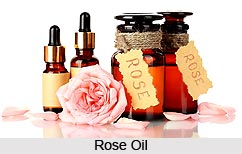 Rose oil is considered an aphrodisiac and it takes several thousand rose petals to produce just one drop of rose oil so it is highly priced. It is one of the most difficult essential oils to distil. This is an herbaceous shrub that originated in Persia and was gradually introduced to all temperate regions.
Rose oil is considered an aphrodisiac and it takes several thousand rose petals to produce just one drop of rose oil so it is highly priced. It is one of the most difficult essential oils to distil. This is an herbaceous shrub that originated in Persia and was gradually introduced to all temperate regions.
It is dry oil; the skin will soak it up quickly without a greasy feeling. It can be used straight or mixed into a cream or lotion. Rose oil should not be used on broken skin or open wounds unless directed to do so by a physician. Rose oil is anti-depressant, anti-septic, anti-viral, astringent and bactericidal and also a tonic to the liver, stomach and uterus. It is known as the "women"s oil", helping with menstrual problems and benefiting the skin, particularly mature or aging skin.
Types of Rose Oil
There are two types of rose oil commonly available: `Rose Otto`; captured by steam distillation of the fresh petals, and "Rose Absolute"; obtained by solvent extraction of the fresh petals. It invokes positive thoughts, spiritualism and feelings of joy, happiness and hope. The oil is said to have mild sedative activity and is used to treat anxiety and depression.
Health Benefits of Rose Essential Oil
The health benefits of Rose Essential Oil can be attributed to its properties as an antidepressant, antiphlogistic, antiseptic, antispasmodic, antiviral, aphrodisiac, astringent, bactericidal, cholagogue, cicatrisant, depurative, emenagogue, haemostatic, hepatic, laxative, nervine, stomachic and uterine substance.
This oil can be well mixed with the following oils: Sandalwood, Jasmine, Neroli, Lavender, Bergamot, Clary Sage, Geranium, Patchouli and Rosewood. However, one should restrain the use of this oil, if high cold and cough condition is present. Being one of the most expensive essential oils, rose is often adulterated for profit.
Uses for Rose Essential Oil
In alternative medicine, rose essential oil is typically touted as an aromatherapy remedy for the following health problems:
•Anxiety
•Stress
•Coughs
•Depression
•Headache
•Menopausal symptoms
•Menstrual cramps
•Migraine
In addition, rose essential oil is said to enhance libido, reduce stress, stimulate circulation, sharpen memory, and boost mood.
When applied directly to skin, beauty products containing rose essential oil are purported to reduce wrinkles, improve moisture, and reverse signs of aging.
Some Home-made Tips to get benefits of Roses
Roses are highly nourishing to the skin. They are beneficial to all skin types, especially dry, sensitive and aging skin. Roses can diminish redness in the skin caused by enlarged capillaries. They also have a toning effect, and are naturally antiseptic.
•Rose for body odour- make a paste of fresh rose petals in water & apply it all over the body. Wait for half an hour & then bath as usual. This will also soothe your senses.
•Rose for mouth odours- roses are useful in treating any kind oral problems. Take fresh rose petals wash them properly & chew for about 2mins. Doing this everyday in morning will give healthy & stronger teeth. It also checks gum-bleeding
•For Itching and Skin Irritation- mix some lemon juice with essential rose oil & use it as a lotion on affected area.
•Mouth ulcers- boil some rose petals in 1liter of water allow it to cool. Gargle with this water 2-3 times a day.
•For naturally glowing and youthful skin and body- chew some rose petals everyday. It clears the system from within to give a natural glow. It will strengthen bones & joints if eaten on a regular basis & reduces chances of arthritis and other bone related problems.
•For eyes- pure rose water is good for various vision problems. Put 2 drops of it before going to bed
•For headache- make rose petal paste in water & apply it all over the forehead for instant relief.
Caution: It can eliminate headaches if used in mild concentrations, but its strong aroma can do just the opposite if a very high concentration is used. Rose essential oil should not be taken internally without the supervision of a health professional. Internal use of rose essential oil may have toxic effects. Before use, essential oils should be diluted in a Carrier Oil. With any essential oil, there is the risk of contact sensitivity. Pregnant and nursing women and children should consult their primary health care providers before using essential oils.




